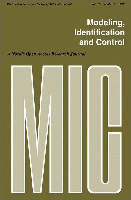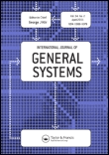
ADVANCES IN COMPLEX SYSTEMS
Scope & Guideline
Advancing Knowledge in Multidisciplinary Complexity
Introduction
Aims and Scopes
- Complex Network Analysis:
The journal emphasizes the study of complex networks, including the structural properties, dynamics, and implications of networked systems across different contexts, such as social, biological, and technological networks. - Agent-Based Modeling:
A significant focus is placed on agent-based modeling (ABM) as a methodology for simulating interactions within complex systems, allowing researchers to explore emergent phenomena and the behavior of heterogeneous agents. - Human Behavior and Social Dynamics:
Research often investigates the dynamics of human behavior, including opinion formation, social influence, and the effects of social structures on individual and collective actions within complex systems. - Interdisciplinary Applications:
The journal promotes interdisciplinary studies that apply complex systems theory to various fields, such as economics, sociology, biology, and environmental science, highlighting its broad applicability. - Mathematical and Computational Approaches:
It encourages the use of mathematical modeling and computational techniques for analyzing complex systems, including statistical methods and algorithmic strategies for understanding system dynamics.
Trending and Emerging
- Machine Learning in Complex Systems:
Recent papers highlight the integration of machine learning technologies in analyzing and addressing challenges within complex systems, particularly in humanitarian work, indicating a growing intersection between AI and complex systems research. - Socio-Technical Systems:
There is an increasing emphasis on understanding socio-technical systems, particularly in the context of mobility and human behavior, suggesting a trend towards exploring how technology and society interact and influence each other. - Epidemic Modeling and Public Health:
The journal has seen a surge in research related to epidemic modeling, particularly in light of the COVID-19 pandemic, reflecting a critical interest in understanding disease dynamics within complex networks. - Cultural and Social Complexity:
Emerging themes surrounding cultural complexity and social networks indicate a growing interest in how cultural dynamics and social interactions shape complex systems, particularly in historical and contemporary contexts. - Resilience and Sustainability:
There is a notable trend towards exploring resilience and sustainability within complex systems, focusing on how systems adapt and respond to various challenges, including environmental and social changes.
Declining or Waning
- Classical Game Theory Applications:
While game theory remains relevant, the specific applications of classical game theory models, such as the Prisoner's Dilemma, appear to be less frequent, possibly as researchers explore more complex dynamics that incorporate additional factors and agent interactions. - Traditional Statistical Analysis:
The reliance on traditional statistical analysis methods for understanding complex systems seems to be waning, as there is a trend towards more sophisticated modeling techniques that better capture the intricacies of complex interactions. - Static Network Models:
There is a noticeable reduction in studies focusing solely on static network models, as researchers increasingly emphasize dynamic and multiplex networks that reflect real-world complexities more accurately.
Similar Journals

MODELING IDENTIFICATION AND CONTROL
Empowering Innovation in Modeling and SimulationMODELING IDENTIFICATION AND CONTROL is a prominent academic journal dedicated to the fields of Computer Science Applications, Control and Systems Engineering, Modeling and Simulation, and Software. Published by MIC in Norway, this open access journal has been providing valuable insights and innovative research since 1980, promoting the free dissemination of knowledge. With a reputation reflected in its 2023 quartile rankings—Q3 in Computer Science Applications, Q2 in Control and Systems Engineering, and Modeling and Simulation, as well as Q3 in Software—this journal plays a vital role in advancing theoretical and practical solutions within its disciplines. Researchers and professionals benefit from its rigorous peer-review process and impactful publications, fostering collaboration and the exploration of emerging technologies across various applications. The journal's continual commitment to excellence is exemplified by its active presence in Scopus, where it maintains respectable rankings in relevant engineering and computer science subcategories, supporting its goal to be a pivotal resource for scholarly communication and practical advancements.

Journal of Physics-Complexity
Connecting Ideas, Inspiring Discoveries in Complexity ScienceThe Journal of Physics-Complexity, published by IOP Publishing Ltd, is a premier open access journal that has been making significant strides in the fields of Artificial Intelligence, Computer Networks and Communications, Computer Science Applications, and Information Systems since its establishment in 2020. Operating from the United Kingdom, this journal aims to foster interdisciplinary research that bridges theoretical and applied aspects of complexity science. With an admirable Q2 ranking in four prestigious categories and a Scopus ranking indicating it holds a solid position within its fields, this journal caters to a diverse audience of researchers, professionals, and students eager to explore the intricacies of complex systems. Its open access model ensures that groundbreaking research is readily available to the global community, thereby enhancing the dissemination of knowledge and information. As it converges towards 2024, the Journal of Physics-Complexity is poised to expand its influence, inviting innovative contributions that challenge conventional thinking and push the boundaries of scientific discovery.

Advances in Electrical and Computer Engineering
Empowering Innovation in Electrical and Computer ScienceAdvances in Electrical and Computer Engineering is a leading open-access journal published by the University of Suceava, Faculty of Electrical Engineering, since 2007, promoting the dissemination of innovative research in the fields of electrical engineering and computer science. With an ISSN of 1582-7445 and an E-ISSN of 1844-7600, the journal serves as a vital resource for researchers, professionals, and students, contributing to the growth of knowledge and technology in these critical areas. The journal holds a respectable Q3 ranking in both Computer Science and Electrical and Electronic Engineering, reflecting its commitment to quality and relevance in high-impact research. Recognized in Scopus, it ranks #154 out of 232 in General Computer Science and #528 out of 797 in Electrical and Electronic Engineering, indicating its solid standing in the academic community. By providing open access to invaluable research findings, Advances in Electrical and Computer Engineering plays a pivotal role in advancing the frontiers of technology and engineering.

INTERNATIONAL JOURNAL OF GENERAL SYSTEMS
Catalyzing Collaboration in Scientific InquiryThe INTERNATIONAL JOURNAL OF GENERAL SYSTEMS, published by TAYLOR & FRANCIS LTD, is a prestigious peer-reviewed journal dedicated to advancing the fields of systems theory and its applications across a variety of scientific disciplines. With an ISSN of 0308-1079 and an E-ISSN of 1563-5104, this journal has carved a niche since its inception in 1974, continuing to provide a platform for innovative research through to 2024. Featured in the esteemed Q2 category in multiple domains, including Computer Science Applications, Control and Systems Engineering, and Information Systems, it serves as a vital resource for the scientific community, fostering interdisciplinary collaboration. The journal's rankings in Scopus reflect its quality, with noteworthy positions in fields such as Mathematics, Engineering, and Theoretical Computer Science. While access is through subscription, the journal remains an essential conduit for researchers, professionals, and students eager to deepen their understanding of general systems and their complex interactions within various environments.

BIOLOGICAL CYBERNETICS
Pioneering Research in Biological CyberneticsBIOLOGICAL CYBERNETICS is a premier journal published by SPRINGER, dedicated to advancing the fields of biotechnology and computer science through the lens of biological interactions. With an ISSN of 0340-1200 and an E-ISSN of 1432-0770, this esteemed journal has been a cornerstone of academic research since its inception in 1961 and is set to continue influencing the landscape of biological cybernetics through 2024. The journal currently holds a Q3 ranking in the Biotechnology category and a Q2 ranking in miscellaneous Computer Science according to the 2023 category quartiles, showcasing its credibility and impact in the interdisciplinary nexus of these fields. Although it does not provide open access options, researchers and students can engage with its innovative content that includes original research articles, reviews, and methodologies that explore the computational modeling of biological systems and the integration of artificial intelligence in biological research. With its strategic location in the United States and a robust publication record, BIOLOGICAL CYBERNETICS remains an essential resource for anyone looking to deepen their understanding and application of cybernetic principles within biological contexts.

EPJ Data Science
Unlocking Insights Through Open Access ResearchEPJ Data Science is a prominent open-access journal affiliated with SPRINGER, dedicated to disseminating high-quality research in the fields of Computational Mathematics, Computer Science Applications, and Modeling and Simulation. Established in 2012, this journal provides a scholarly platform for innovative ideas and methodologies aimed at advancing data science, bridging gaps between theoretical foundations and practical applications. With impressive rankings, including Q1 in Modeling and Simulation and Q2 in both Computational Mathematics and Computer Science Applications as of 2023, EPJ Data Science is recognized for its significant contributions to academia, evidenced by its strong performance in Scopus rankings. The journal is committed to open access, ensuring that research is accessible to a global audience, thereby enhancing collaboration and interdisciplinary communication. Located at One New York Plaza, Suite 4600, New York, NY 10004, United States, it serves as a hub for researchers, professionals, and students eager to share and explore pioneering developments in data science.

Networks and Heterogeneous Media
Exploring the Intersection of Complex Systems and Heterogeneous MediaNetworks and Heterogeneous Media is a distinguished journal published by the American Institute of Mathematical Sciences (AIMS), focusing on the dynamic interplay of networks across various interdisciplinary fields including applied mathematics, computer science, and engineering. With a diverse and robust scope, the journal aims to facilitate the advancement of knowledge regarding complex systems and heterogeneous media through the publication of cutting-edge research. The journal has exhibited notable academic impact, currently positioned in Q2 and Q3 quartiles across several key categories such as applied mathematics, engineering, and statistics, indicating its relevance and influence within the scientific community. Researchers and professionals exploring intricate mathematical models, computational applications, and statistical methodologies will find Networks and Heterogeneous Media an invaluable resource for both foundational studies and innovative applications. The journal regularly publishes high-quality articles, contributing to emerging discussions and developments in a rapidly evolving field.

Journal of Systems Science & Complexity
Unraveling Complexity Through Innovative Research.The Journal of Systems Science & Complexity, published by SPRINGER HEIDELBERG, stands as a leading forum for innovative research in the fields of computer science and information systems. With an ISSN of 1009-6124 and an E-ISSN of 1559-7067, this journal has established itself within the academic community, garnering a commendable impact factor that reflects its influential contributions. Operating from 2006 and continuing through 2024, it is categorized in the Q2 quartile for both Computer Science (Miscellaneous) and Information Systems, indicating its quality and relevance. Recognized within Scopus rankings, it places 52nd out of 133 in its specific field, affirming its significance in advancing systems science discussions. Researchers and professionals will find a wealth of knowledge through rigorous peer-reviewed articles that explore complex systems and their applications, enabling readers to stay at the forefront of technological advancements and interdisciplinary collaboration.

Nonlinear Dynamics Psychology and Life Sciences
Illuminating the Dynamics of Psychological PhenomenaNonlinear Dynamics Psychology and Life Sciences is a leading journal published by the SOC CHAOS THEORY PSYCHOLOGY & LIFE SCIENCES, focusing on the intersection of nonlinear dynamics and psychological phenomena as well as their implications in life sciences. With an ISSN of 1090-0578 and an E-ISSN of 1573-6652, this journal stands out as a reputable source of innovative research and analytical studies that contribute significantly to the fields of applied mathematics and psychology. By delving into the complex behaviors and patterns of dynamic systems, the journal addresses vital contemporary issues, making it essential reading for researchers, professionals, and students alike. Although it operates on a traditional access model, the journal's insights are invaluable for understanding the empirical background behind nonlinear dynamics in psychological research. Recognized within the academic community for its contributions, it holds a 2023 Scopus ranking of #436 out of 635 in the Applied Mathematics category, placing it in the 31st percentile, and it is designated as Q3 in its quartile categorization. As a bridge between theoretical foundations and real-world applications, Nonlinear Dynamics Psychology and Life Sciences aims to foster interdisciplinary dialogue and inspire future research in this exciting and evolving field.

FRACTALS-COMPLEX GEOMETRY PATTERNS AND SCALING IN NATURE AND SOCIETY
Transforming Perspectives Through the Lens of Fractal GeometryFRACTALS: COMPLEX GEOMETRY, PATTERNS AND SCALING IN NATURE AND SOCIETY, published by World Scientific Publishing Company, is a pioneering journal in the fields of applied mathematics, geometry and topology, modeling and simulation, and multidisciplinary studies. Now celebrating nearly three decades since its inception in 1995, this esteemed publication boasts significant rankings, including Q1 status in Multidisciplinary research and Q2 rankings in Applied Mathematics, Geometry and Topology, and Modeling and Simulation for 2023. Researchers and professionals in the domains of complex systems, fractal geometry, and their applications will find this journal to be a vital resource that bridges theoretical mathematics and practical applications across various disciplines. With a commitment to disseminating cutting-edge findings and fostering interdisciplinary collaboration, FRACTALS plays an essential role in advancing knowledge that reflects the intricate patterns present in both nature and society.